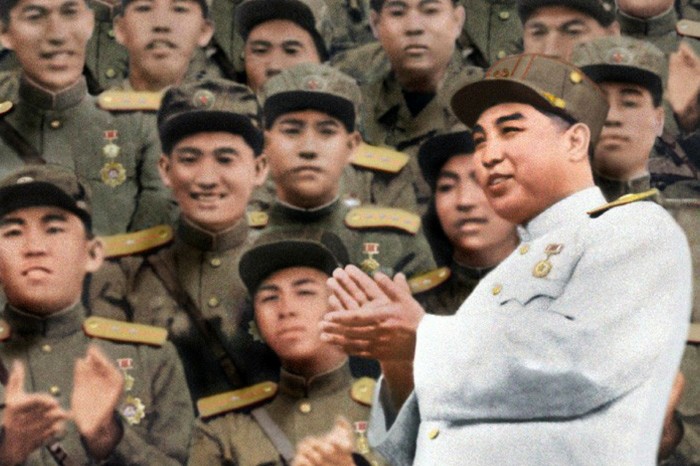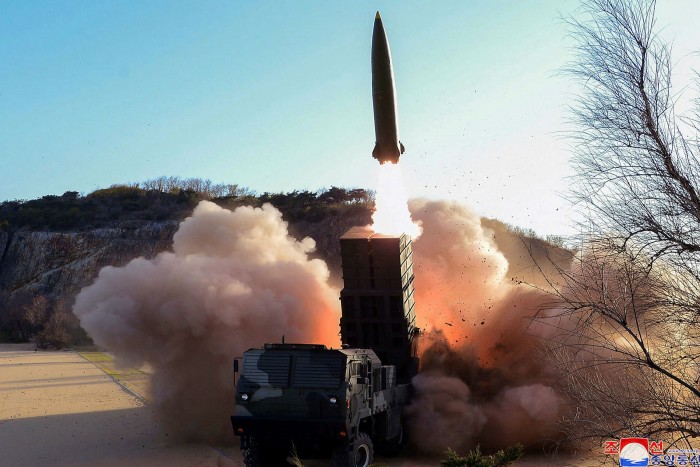North Korean dictator Kim Jong Un may harbour ambitions to use his nuclear weapons programme to assert control over the entire Korean peninsula, experts have warned.
Andrei Lankov, one of the world’s pre-eminent scholars on North Korea, said the Kim regime’s nuclear arsenal, which is growing in scale and sophistication despite strict international sanctions, had superseded its defensive needs.
“The North Korean nuclear programme was initially purely defensive. They were afraid, correctly, that without nuclear weapons they would be invaded,” said Lankov, who is a professor of history at Kookmin University in Seoul.
“But now it is clearly overkill from a defensive point of view. They don’t really need intercontinental ballistic missiles and they don’t really need a thermonuclear device. This leads me strongly to suspect that their ultimate dream is to assert their control over South Korea.”
Kim Jong Un has long sought to associate himself in the minds of North Koreans with his grandfather, Kim Il Sung, who died in 1994 just as the country he had ruled with an iron fist descended into a brutal famine that killed millions.
A former guerrilla fighter described by one contemporary as resembling “a fat delivery boy from a neighbourhood Chinese food stall”, Kim Il Sung was installed as North Korea’s ruler by the Soviets in 1948 and in 1950 launched a disastrous invasion against the South.

The conflict ended in stalemate three years later, after US-led UN forces and Mao Zedong’s China intervened in support of the South and North, respectively.
With his nuclear weapons programme developing apace, some North Korea watchers worry that the younger Kim hopes to succeed where the “Father Generalissimo” failed: to wrest control of the entire Korean peninsula.
At a military parade in Pyongyang on Monday, Kim Jong Un said that North Korea’s nuclear weapons had a “secondary mission” beyond the “primary mission” of preventing war.
According to North Korean state news agency KCNA, Kim said that “our nuclear [programme] cannot be tied to this one mission of war prevention”. If North Korea’s “fundamental interests” were infringed, he added, “our nuclear forces cannot but go ahead with their secondary mission”.
Lankov said that rather than seeking to invade or occupy South Korea, a more realistic scenario would be the dictator using nuclear blackmail to deter US intervention while coercing South Korean leaders.
“When the situation is favourable, for example when the US is completely distracted by some crisis, or the tenant of the White House is weak or eccentric or Donald Trump the Second, the North Koreans would provoke a crisis, deploy their ICBMs, and keep the Americans out by forcing them to choose between sacrificing San Francisco or Seoul,” said Lankov.
“They could then use their tactical weapons to obliterate the significant conventional superiority of the South Korean forces, and install an ambassador in Seoul with veto power over any South Korean policy they do not like,” he added, likening Kim’s ambitions to Vladimir Putin’s “demilitarisation and denazification” strategy in Ukraine.
“Will it happen? Probably not. Is it their dream? Yes, I think it is.”
Go Myong-hyun, a senior fellow at the Asan Institute for Policy Studies think-tank in Seoul, said that the regime had probably noted western reluctance to confront Russia militarily over its invasion of Ukraine.
“Many people assume that North Korea is looking at the war from the perspective of Ukraine, as a country that could be invaded if it does not have nuclear weapons,” said Go.
“But Pyongyang sees things from the perspective of Russia, which is showing how the mere threat of nuclear use can grant the attacker a strategic advantage.”
Go added: “Its nuclear weapons programme cannot be solely defensive when it has hundreds of nuclear warheads and is continuously looking to diversify its means of delivery.”

North Korea has flaunted an array of increasingly sophisticated weapons in recent months, including a manoeuvrable “hypersonic glide vehicle” and a “monster” ICBM potentially capable of striking the US mainland.
This month, it tested a new type of short-range missile that state media said was the first to boast a tactical nuclear weapons delivery role.
Kim Yo Jong, Kim Jong Un’s sister and a high-ranking regime official, recently spelt out a scenario in which North Korea inflicted “extermination” on South Korean forces poised to launch a pre-emptive strike.
“I do think there is a possibility that Kim Jong Un could still pursue the unification of the two Koreas,” said Jeon Kyung-joo, a researcher at South Korea’s state-funded Korea Institute for Defence Analyses.
“He is young enough to have long-term goals, and North Korea’s weapons development is more than sufficient for regime survival.”
Analysts stressed that the most likely path to war on the peninsula remained brinkmanship and miscommunication, rather than an attempt by Kim to succeed where his grandfather failed.
Ankit Panda, a nuclear weapons expert at the Carnegie Endowment for International Peace, said that North Korea’s nuclear programme “has actually enhanced its confidence in its ability to coexist alongside South Korea”.
He warned that Pyongyang’s progress in developing tactical nuclear weapons “would lower the already low threshold for nuclear use on the peninsula, and make future bouts of brinkmanship with the US and South Korea all the more dangerous”.
Soo Kim, a former CIA analyst now at the Rand Corporation think-tank, said: “North Korea will of course keep the US in mind as it continues to make advancements in its nuclear and missile capabilities.
“But, more than anything, the regime’s development of tactical nuclear weapons bears the potential to threaten South Korea.”
While accepting that the likelihood of a North Korean move to assert control over the peninsula remained remote, Lankov warned policymakers not to exclude it.
“The scenario I have outlined has moved in recent years from the realm of the impossible to the realm of the very unlikely,” said Lankov. “That is a big difference.”

